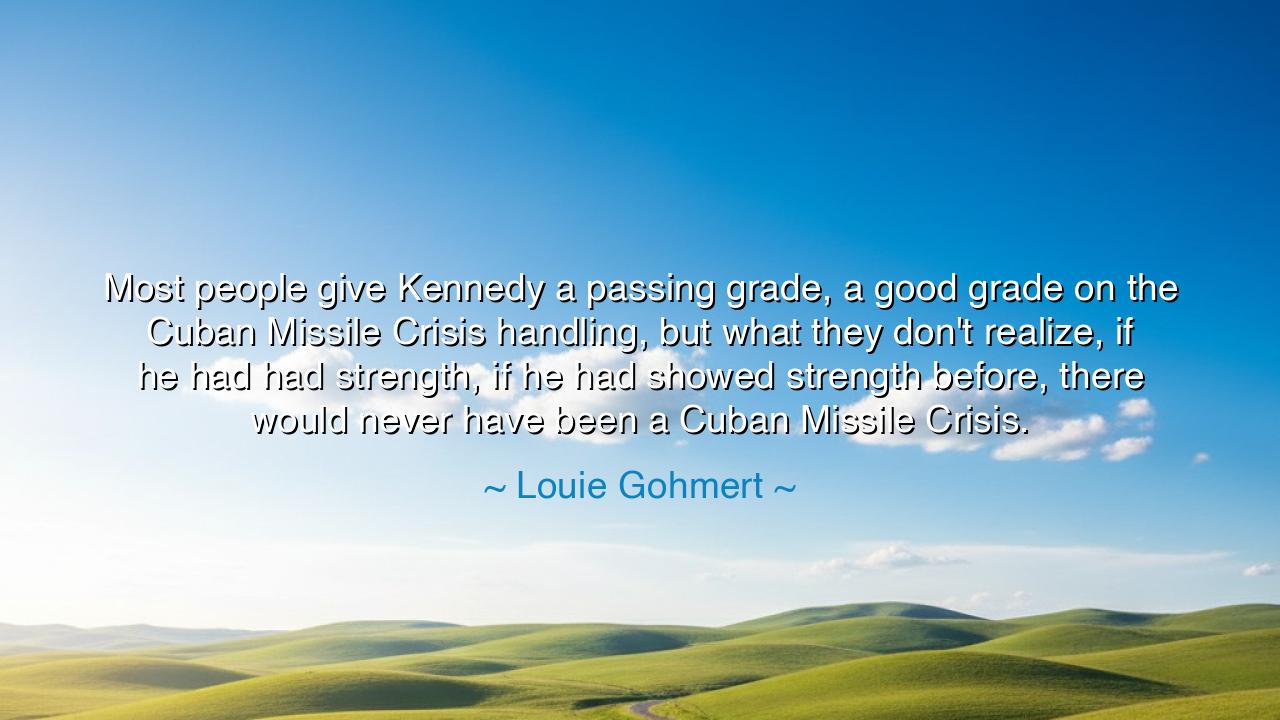
Most people give Kennedy a passing grade, a good grade on the
Most people give Kennedy a passing grade, a good grade on the Cuban Missile Crisis handling, but what they don't realize, if he had had strength, if he had showed strength before, there would never have been a Cuban Missile Crisis.






Hear, O children of history, the sharp words of Louie Gohmert, who judged the past with stern remembrance: “Most people give Kennedy a passing grade, a good grade on the Cuban Missile Crisis handling, but what they don't realize, if he had had strength, if he had showed strength before, there would never have been a Cuban Missile Crisis.” These words echo the eternal debate of statesmen and warriors alike: is it enough to shine in the hour of peril, or must strength be shown beforehand, so that peril never rises?
The Cuban Missile Crisis of 1962 was one of humanity’s darkest dances with destruction. For thirteen days, the world stood on the brink of nuclear fire. President John F. Kennedy and his council faced the Soviet Union’s bold act of placing missiles upon the soil of Cuba, within striking distance of American cities. Kennedy’s measured resolve, his choice to blockade rather than strike, earned him praise as a leader who guided his nation away from the abyss. Many gave him honor, saying he had passed the greatest test of his presidency.
Yet Gohmert reminds us of another truth: crises do not spring from the void, but from the choices made long before. He declares that had Kennedy shown greater strength in earlier dealings—had he projected firmness and power before Khrushchev and Castro—perhaps the missiles would never have been placed at all. Here lies the old lesson: weakness, or even the perception of weakness, invites challenge, while strength displayed early may prevent the storm. Thus Gohmert’s critique is not of Kennedy’s crisis management, but of his failure to deter the crisis itself.
History offers other examples of this principle. Consider the tale of Neville Chamberlain, who sought peace through concessions to Hitler before the Second World War. His appeasement, though well-meaning, emboldened tyranny and opened the door to greater calamity. By contrast, Ronald Reagan, decades later, faced the Soviet Union with firm resolve, declaring “Mr. Gorbachev, tear down this wall!” His strength of posture, shown not in war but in unflinching rhetoric and military readiness, helped bring an empire to its knees without open conflict. These stories remind us that strength shown early can spare generations from the crucible of war.
Yet we must weigh this teaching with wisdom. For strength is not mere aggression, nor is it reckless boasting. True strength is the balance of firmness and restraint, of clarity and courage. To show strength before crisis is not to provoke, but to make clear that one cannot be provoked without consequence. Kennedy’s critics and defenders alike agree on one point: had signals been stronger earlier, the Soviets might have thought twice before placing missiles in Cuba.
The lesson, O listeners, is not only for kings and presidents, but for every soul who faces trial. Do not wait until the crisis has already consumed you before showing your resolve. Show your strength in small things—in discipline, in honesty, in courage—so that when great storms arise, those who would test you know already the power you hold. Many conflicts in life are born not from the presence of malice alone, but from the absence of visible strength.
Practical is this counsel: cultivate strength before the hour of need. Speak truth with firmness so that deception fears to approach. Stand with dignity so that injustice hesitates to strike. Train your will in daily trials, so that when greater battles come, your very presence dissuades them. For crises avoided are the quiet victories of those who walk with strength unshaken.
Thus remember the words of Louie Gohmert: “If he had had strength before, there would never have been a Cuban Missile Crisis.” Whether one agrees with his judgment of Kennedy or not, the teaching endures: strength displayed in time may prevent disaster. Let this truth guide you, in statecraft and in life, that you may live not only as one who survives crises, but as one who prevents them, and in so doing, preserves peace.






AAdministratorAdministrator
Welcome, honored guests. Please leave a comment, we will respond soon